FGASA Qualifications & Courses
What is a FGASA Qualification?
FGASA is a CATHSSETA accredited training provider for tourism guiding in South Africa. The equivalent CATHSSETA qualifications can be attained through FGASA, thus allowing you to attain the required National Skills Program Certificates and Qualifications. At present some of the national qualifications/skills programmes can be attained through FGASA. There are also number of other certificate we offer that are exclusive to FGASA.
A FGASA qualification is more than just a certification, it is a commitment to the highest standards of professionalism in tourist guiding. Our standards of training go above and beyond the minimum requirement, making those with a FGASA qualification highly sort after within the safari tourism, cultural and heritage tourism, and marine tourism industries. Our members have a defined career path set out by FGASA, being a member of the organisation gives you access to this structured set of qualifications with an easy to understand, developmental approach to skills and career growth.
Our learning materials have been developed by industry experts with centuries of combined experience. Our Assessors and Mentors are vetted against a strict criteria of theoretical knowledge, practical skill and thousands of hours of experience in their fields, meaning they are some of the top in their respective industries. The FGASA standard is recognised across southern Africa as the top-tier of guiding development and training.
Learn more about our qualifications below:
Nature Site Guide Qualifications
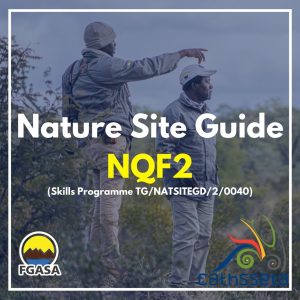
Follow the steps below to get your first Nature Site Guide Qualification:
- Visit www.fgasa.co.za and register to become a member
- Enroll for the Nature Site Guide NQF2 Qualification and pay the relevant fee
- Enrollment fee includes: registration with FGASA, membership subscription for one year, all required learning materials
- Study the learner manual and complete the workbook to help you prepare for the theory exam
- Book and pay for your theory exam when you are ready to write it
- Pass the exam with a minimum of 75%, this will declare you theoretically competent
- Book your practical assessment with a CATHSSETA Accredited FGASA Assessor
- Pass the practical assessment
- You will be awarded with your Nature Site Guide NQF2 qualification
- Additional steps are required to guide legally in South Africa
- Register with CATHSSETA (FGASA will do this on your behalf – additional documentation required)
- Once you have your CATHSSETA number you must register with the National Department of Tourism (NDT)
- Find the NDT’s Registrar for your province here
- Must have a valid First Aid certificate recognised by the Department of Labour South Africa
- Must have a Professional Driver’s Permit (PrDP) from the Licensing Department if you intend to drive guests in a vehicle
**Full qualification requirements are detailed in the PDF below. Please be sure to read this carefully.
Your career in wildlife starts here! FGASA is a CATHSSETA accredited training provider that sets standards of guiding excellence and professionalism. FGASA guides are known worldwide for their knowledge, skills, and conduct making them some of the most in-demand nature guides for the safari and tourism industries.
Our Nature Site Guide (NQF2) skills programme establishes a solid foundation of necessary knowledge, hard-skills and soft-skills needed to excel as a nature guide, field guide, or safari guide. The Nature Site Guide NQF2 course contains the following learning modules and outcomes:
Module 1: Guiding in the Natural Environment and Creating a Guided Experience
By the end of this module, you will be adept at the basics of delivering a well-rounded, informative, entertaining, and impactful guided experience in nature. You will understand the ethical considerations of conducting a guided experience, gain a good understanding about the aims of being a nature guide and how you can facilitate meaningful experiences in nature, helping to educate guests and play a role in preserving and maintaining Earth’s ecosystems and biodiversity.
Module 2: Geology
By completing this module, you will be able to discuss the basic composition of the Earth, its various layers and how geographical features are formed. Gain knowledge and understand of the critical role geology plays in species distribution and determination according to an area’s underlying geology and be able to interpret the various mechanisms of weathering and erosion that determine specific soil types.
Module 3: Climate and Weather
In this module you will learn and be able to define the key differences between overall climate and localised weather. You will be able to talk about how the oceans and altitude affect weather and temperature. Discuss how geographical positioning on the planet impacts climate and weather and understand how key weather systems, rainfall, and pressure systems impact local fauna and flora.
Module 4: Astronomy
At the end of this module, you will be able to recognise and interpret the starry night skies of the Southern Hemisphere, the visible constellations and gain essential information on our solar system. You will be able to discuss what exists beyond our solar system, within the larger universe, identify common constellations and how these can be used to navigate and determine seasonality. You will also be able to explain the impact of celestial bodies on global oceanic tides.
Module 5: Ecology
In this module you will gain the knowledge to understand the ecological levels of organisation and how these enable life and survival, be able to talk about how necessary nutrients and ecological energy are continuously and self-sustainably cycled through ecosystems, and you will be able to explain symbiosis and interspecies relationships in the environment.
Module 6: Biomes of Southern Africa
This module will teach you how to discuss the definition of a biome and the various parameters that determine what a biome is, know about all the different biomes that occur in South Africa and understand the key defining features of the fynbos biome and fynbos floral kingdom.
Module 7: Taxonomy
This module will teach you to understand the importance of hierarchal ordering in species identification. You will be able to talk about how living organisms are named and understand why species names change over time.
Module 8: Plants – Trees, shrubs, forbs, and grasses
In this module you will learn about and be able to discuss the importance of botany in ecosystems. You will be able to differentiate and identify diverse types of plant species and how these add to a guided experience. You will be able to explain how plants are classified, understand the fungal kingdom and its role in ecology. You will understand and be able to apply ancient medicinal knowledge of common African plant species.
Module 9: Arthropods
This module will cover everything you need to know to talk about and understand various arthropod species, their vital roles in ecosystems and how to identify them. By the end of this module, you will have a good understanding of insects, arachnids and chilopods.
Module 10: Fish
By the end of this module, you will be able to discuss basic classifications that determine animals of fish, you will have knowledge on the ecological role fish play in the natural environment. You will also develop a good understanding of fish behaviour.
Module 11: Amphibians
This module will teach you all the basics needed to understand and talk about various amphibian species with your guests. You will be able to effectively tell the difference between frogs and toads, discuss the importance of amphibians in ecosystems and interpret amphibian behaviour.
Module 12: Reptiles
This module will teach you everything you need to know about the stunning array of reptiles you could possibly encounter in Southern Africa. You will be able to discuss and identify the characteristics of reptiles as well as three main orders of reptiles found in Africa. You will gain important knowledge on the classifications of different types of snake venom, and you will be able to demonstrate the ecological importance of reptiles.
Module 13: Birds
By the end of this module, you will have the skills and knowledge needed to understand and talk about the characteristics and classifications of birds. You will be able to identify various bird species quickly and accurately as well as discuss bird behaviour.
Module 14: Mammals
This module will equip you with the knowledge to understand and discuss the characteristics and classifications of mammals. You will develop the skills needed to identify mammals through various parameters such as foot structure, feeding behaviour and taxonomic orders. You will also gain a deep understanding of ‘flagship’ species and their critical roles in maintaining ecosystems.
Module 15: Ethology (Animal behaviour)
This module will teach you the important basics of interpreting animal behaviour as a nature guide, and how animal behaviour can inform ethical decision making while conducting a guided experience. You will be able to discuss the differences between solitary animal and social animal behaviours and you will gain an understanding of animal tracks and signs deepening your ability to talk to guests about animals, even if you do not see them.
Module 16: Conservation and Habitat Management
This module covers everything you need to know about how natural landscapes are effectively managed and the role you play in this as a nature guide. You will be able to discuss and implement modern methods of ecological habitat management and restoration. You will gain in-depth knowledge on how fire is used as an important ecological management tool, how to prevent soil erosion and how to identify and safely remove alien invasive species.
Module 17: Historic Human Habitation
The landscapes of Africa have long, rich histories steeped in culture and tradition. As a nature guide it is important for you to understand how these cultures and traditions have shaped modern day reserves and wilderness areas. This module will give you a good understanding of the historic heritage and vibrant cultures of the people of South Africa. The significance of archaeological sites in Southern Africa as well as an understanding of the multiple languages spoken in South Africa.
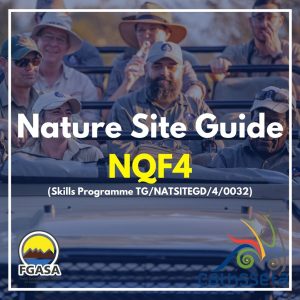
Follow the steps below to progress to your second Nature Site Guide Qualification:
- You need to already be a FGASA member, your membership needs to be up-to-date
- Need to already have the Nature Site Guide NQF2 qualification
- Need to have a minimum of 260 days experience working as a guide logged in your green Field Guide Logbook
- Enroll for the Nature Site Guide NQF4 Qualification and pay the relevant fee
- Enrollment fee includes: all required learning materials
- You need to complete the two compulsory elective modules and at least one other chosen elective module
- Study the learner manual and complete the workbook to help you prepare for the theory exam
- Book and pay for your theory exam when you are ready to write it
- Pass the exam with a minimum of 75%, this will declare you theoretically competent
- Book your practical assessment with a CATHSSETA Accredited FGASA Assessor. You have three years to complete your practical assessment. If you do not complete your practical assessment within three years of writing the theory, you will be required to write the theory exam again before attempting your practical assessment.
- Pass the practical assessment
- You will be awarded with your Nature Site Guide NQF4 qualification
- Additional steps are required:
- Update CATHSSETA with your new qualification (FGASA will do this on your behalf – additional documentation required)
- Must have a valid First Aid certificate recognised by the Department of Labour South Africa
- Find the NDT’s Registrar for your province here
**Full qualification requirements are detailed in the PDF below. Please be sure to read this carefully.
Welcome to the next phase of your FGASA Field Guiding career! The FGASA Field Guide NQF4 skills programme is accredited by CATHSSETA. This next step in your career development builds on the solid foundation of knowledge gained during the NQF2 course.
Please note that to complete your FGASA Field Guide NQF4 qualification you will need to have fully completed both the theoretical and practical assessments of your NQF2 course. You will also need to have logged at least 260 days working as a guide at a lodge, so that you may be practically assessed or your NQF4 qualification. The FGASA Field Guide NQF4 skills programme also requires the completion of two additional compulsory workbooks:
- Minimise and Manage Safety in Emergency Incidents
- South African General Knowledge
You are also required to complete a third elective workbook of your choosing:
- Research and Design a Guided Experience at a Prominent Tourist Destination
- Conduct a Guided Birding Experience
- Conduct a Guided Biome Experience
The FGASA Field Guide NQF4 course consists of the following learning modules and outcomes:
Module 1: Introduction
In this first module you will develop an understanding of what is expected of someone at your level of experience while conducting guided experiences in nature. At this point in your career, you will have developed many skills and techniques related to your field and this module will outline the expectations of a FGASA Field Guide.
Module 2: Astronomy
In this module you will build upon your current knowledge of the universe and our solar system. You will be able to discuss different planets and their compositions, explain different space rocks and how they are formed. You will be able to talk about solar winds and explain what these are, further your understanding and identification of yet more constellations in the Southern Hemisphere as well as point out made-made satellites and the International Space Station (ISS).
Module 3: Geology
Continuing from the knowledge you developed during your Nature Site Guide NQF2 skills programme this module will give you an understanding of the rock cycle, more in-depth knowledge on soil formation, a deeper understanding of weathering and erosion as well as being able to discuss the properties and ecology of soils.
Module 4: Climate and Weather
In this module you will develop a greater understanding of Earth’s atmosphere with particular focus on the troposhpere and stratosphere, develop knowledge on the ozone layer, be able to discuss and explain Earth’s complex wind systems and how they regulate global climate as well as develop a greater understanding of global seasonal changes.
Module 5: Ecology
By the end of this module, you will be able to explain with understanding the interactions of Earth’s ecological spheres. You will be able to talk about the hydrological, oxygen, carbon and nitrogen cycles within the natural environment. You will gain a deeper understanding of various ecological niches and be able to identify and talk about limiting factors in ecosystems.
Module 6: Classification
In this module you will learn about the major goals of systemic classification of living organisms and what criteria determine these. You will be able to name, discuss and give examples of the domains and kingdoms living organisms are classified into and you will learn the differences between eukaryotes and prokaryotes.
Module 7: Plants
This module will build upon your established foundation of botanical knowledge. By the end of this module, you will have a deeper understanding of plant classification, flower anatomy, pollination, and plant life cycles. You will also develop an understanding of plant succession and retrogression. Finally, you will be able to discuss and explain photosynthetic pathways in plants and how these enable plants to produce their own energy.
Module 8: Fungi
By the end of this module, you will understand the kingdom fungi and how to classify them. You will understand the differences between fungi, plants, and animals and develop knowledge on diverse types of fungi and their roles in the ecosystem.
Module 9: Bacteria, viruses, and animal diseases
This module will give you the ability to understand and talk about various bacteria, viruses, and diseases encountered in the animal kingdom. You will be able to discuss how bacteria and viruses are classified, the important roles bacteria play in ecosystems, how bacteria and viruses can cause disease and understand animal diseases and how to identify their symptoms.
Module 10: Arthropods
Building upon your arthropod knowledge from your Nature Site Guide NQF2 skills programme this module will give you a deeper understanding of invertebrate phylums and arthropod classification. You will gain knowledge on arthropod sensory organs and how they work and develop increased knowledge on arachnid classification and identification.
Module 11: Segmented worms
This module will give you a good understanding of how to classify segmented worms, explain the basic anatomy of earth worms, and discuss the feeding and reproductive behaviours as well as the role of earth worms in the ecosystem.
Module 12: Molluscs
By the end of this module, you will be able to classify molluscs and explain the basic anatomy of land snails. You will also be able to discuss snail morphology, feeding behaviours, preferred food sources and locomotion. You will also develop and understanding of the basic anatomy, reproduction, and locomotion of bivalves.
Module 13: Fish
This module will continue to develop your knowledge on fish species. By the end of this module, you will be able to talk about freshwater habitats, explain buoyancy, swim bladders and fish reproduction. You will also be able to explain and discuss osmotic regulation in saltwater fish.
Module 14: Amphibians
In this module you will continue to grow your knowledge on amphibians and be able to understand how frogs are grouped, the processes employed in sound production and the various vocal sacks in frogs. You will also be able to discuss different environmental and defensive adaptations as well as the importance of frogs as bioindicator species.
Module 15: Reptiles
By completing this module, you will increase your knowledge and ability to talk about various reptile species. You will be able to understand and discuss the differences between chelonian species in Southern Africa. You will develop a good understanding of reptile senses. You will be able to talk about reptile reproduction, parental care and offspring development. Finally, you will be able to understand and explain different reptile venoms, symptoms, and their effects.
Module 16: Birds
At the end of this module your knowledge and understanding of birds will be increased to include the basic mechanics of flight. Bird reproduction including egg development, incubation, and brooding. You will be able to discuss bird song and birds calls as well as gain increased knowledge on bird migration and associated reasons.
Module 17: Mammals
This module will continue to develop your knowledge and understanding of mammals starting with herbivore classification, their digestive systems, the relationships between food consumption, body size and homeostatic regulation. You will also develop a good understanding of the key differences between horns and antlers.
Module 18: Animal behaviour
In this module you will further your knowledge and understanding of animal behaviour including protective behaviours and their reasons. You will also be able to talk about animal communication, courtship displays and mating behaviours in more detail. You will be able to discuss animal agonistic behaviours and gain an understanding of animal reactive zones.

Follow the steps below to progress to your Professional Field Guide Qualification:
- You need to already be a FGASA member, your membership needs to be up-to-date
- Need to already have the Nature Site Guide NQF4 qualification
- Need to have a minimum of 520 days experience working as a guide logged in your green Field Guide Logbook
- Enroll for the FGASA Professional Field Guide Qualification and pay the relevant fee
- Enrollment fee includes: all required learning materials
- Must complete all elective subjects (one or more of these would have been completed during your NQF4 qualification)
- Study the learner manual and complete the workbook to help you prepare for the theory exam
- Book and pay for your theory exam when you are ready to write it
- Pass the exam with a minimum of 75%, this will declare you theoretically competent
- Book your practical assessment with a CATHSSETA Accredited FGASA Assessor. You have three years to complete your practical assessment. If you do not complete your practical assessment within three years of writing the theory, you will be required to write the theory exam again before attempting your practical assessment.
- Pass the practical assessment
- You will be awarded with your FGASA Professional Field Guide qualification
- No additional steps are required, the Professional Field Guide Qualification rests solely with FGASA
**Full qualification requirements are detailed in the PDF below. Please be sure to read this carefully.
This is your final step in the FGASA Field Guiding qualification journey. The FGASA Professional Field Guide certification is held exclusively by FGASA and takes your guiding knowledge and skills to the highest attainable level through our qualifications system.
This certification ensures that you have qualified to the highest possible standards of guiding excellence and professionalism.
To complete your FGASA Professional Field Guide qualification, you must have fully completed the theoretical and practical assessments of your NQF4 course. You will also need to have logged at least 520 days working as a guide at a lodge, so that you may be practically assessed or your Professional Field Guide qualification.
The FGASA Professional Field Guide course consists of the following learning materials provided in the book “The Story of Life & the Environment” and “Managing Tourism in southern Africa.” These two books aim to give you more in-depth knowledge about the workings of our natural word as well as how to effectively manage and facilitate tourism experiences in nature.
In addition to the compulsory Professional Field Guide workbooks you will also be required to complete two additional workbooks that were not completed during your NQF4 skills programme. These include the following (choose which ever two modules were not completed during your NQF4):
- Research and Design a Guided Experience at a Prominent Tourist Destination
- Conduct a Guided Birding Experience
- Conduct a Guided Biome Experience
During the Professional Field Guide course you will cover the following learning chapters.
Story of Life & the Environment – Professional Field Guide Workbook 1
- Chapter 1: Life on Earth
- Chapter 2: The Diversity of Life today
- Chapter 3: How our world works
- Chapter 4: How populations work
- Chapter 5: Communities of life
- Chapter 6: Interactions of life
- Chapter 7: Life in fresh water
- Chapter 8: Life in the oceans
- Chapter 9: Life on land
Managing Tourism in Southern Africa – Professional Field Guide Workbook 2
- Chapter 1: Introduction to tourism
- Chapter 2: The history of tourism
- Chapter 3: The geography of tourism
- Chapter 4: Managing visitor attractions
- Chapter 5: Transport for tourists
- Chapter 6: Managing accommodation for tourists
- Chapter 7: Managing travel intermediaries
- Chapter 8: Managing events
- Chapter 9: The government and tourism
- Chapter 10: Managing tourism businesses
- Chapter 11: Tourism and entrepreneurship
- Chapter 12: Managing finance for tourism
- Chapter 13: Marketing for tourism
- Chapter 14: Managing the sociocultural and environmental impacts of tourism
- Chapter 15: Managing the economic impacts of tourism
- Chapter 16: Managing tourism responsibly
- Chapter 17: Sport tourism
- Chapter 18: The future of tourism and tourism trends
Trails Guide® (VPDA) Qualifications

Follow the steps below to get your first Trails Guide VPDA Qualification:
- You need to already be a FGASA member, your membership needs to be up-to-date
- Need to have the full Nature Site Guide NQF2/NQF4 qualification
- Enroll for the Trails Guide NQF2/NQF4 Qualification and pay the relevant fee
- Enrollment fee includes: all required learning materials
- Study the learner manuals and complete the workbook to help you prepare for the theory exam
- Book and pay for your theory exam when you are ready to write it
- Pass the exam with a minimum of 75%, this will declare you theoretically competent
- You need to be declared competent at an Advanced Rifle Handling (ARH) assessment and have the required PFTC proficiencies: US117705; US119651; US123519
- NOTE: FGASA does not issue standalone ARH certificates.
- You may now start logging walking hours in your brown Dangerous Game Logbook
- Once you have completed the required participant hours and encounters you need to then be vetted by a Trails Guide Mentor
- Once you have been vetted you will need to begin logging walking hours as either first or second rifle
- You need to meet the minimum number of required dangerous game encounters and log these in your brown Dangerous Game Logbook
- These hours may be logged in the workplace
- Once you have met the minimum requirements, had your logbook signed off by your mentor and FGASA you may then do the Trails Guide Assessment
- You need to be declared competent by the Assessor
- You will be awarded with your Trails Guide NQF2 qualification, this is the Dangerous Game Site Guide NQF2 Accredited by CATHSSETA
- To obtain the FGASA Trails Guide NQF4 qualification you will need to have the Tracker I certificate (combined Animal Track & Sign and Animal Trailing levels). This is the only additional requirement for the Trails Guide NQF4 qualification. The Trails Guide Qualification is linked directly to the Nature Site Guide Qualification (i.e. if you have Nature Site Guide NQF2 and complete the Trails Guide Qualification you will obtain the Trails Guide (Dangerous Game Site Guide) NQF2 qualification, if you have Nature Site Guide NQF4 and complete the Trails Guide Qualification you will receive the Dangerous Game Site Guide NQF4 Qualification, the Tracker I certificate is compulsory for the FGASA Trails Guide NQF4 Qualification)
- Additional steps are required to guide legally in South Africa
- Update your qualification with CATHSSETA (FGASA will do this on your behalf – additional documentation required)
- Need to have a valid First Aid certificate recognised by the Department of Labour South Africa
- Find the NDT’s Registrar for your province here
**Full qualification requirements are detailed in the PDF below. Please be sure to read this carefully.
The Trails Guide and Rifle Handing course will give you the ability to guide guests safely and ethically on foot in high profile animal areas. The term “high profile animals” specifically refers to lions, leopards, Cape buffalo, elephants, rhinos, and hippos out of water. For the purposes of this course these animals are referred to as “dangerous game.” It is important to note that these animals could be potentially dangerous, and this course will give you the skills needed to view and encounter these animals on foot, with guests, in a safe, ethical, informative, and immersive way.
You will only be able to begin the Trails Guide journey after completing your Nature Site Guide NQF2 (minimum requirement) or FGASA Field Guide NQF4 skills programmes in full. The Professional and SKS DG Trails Guide certifications work on experience and encounters and do not have an associated learner manual, there is however a workbook for the Professional Trails Guide certification.
Contained within the theoretical course curriculum is the following:
Module 1: Protocols: Dangerous Game Walking Qualifications
This module gives you an overview of the various Trails Guide qualifications and requirements to advance those qualifications from Trails Guide NQF2 all the way up to Trails Guide SKS DG Mentor and Assessor requirements. By the end of this module, you will have a clear understanding of the requirements to become a Trails Guide, how to complete your logbooks and the potential career path you may follow as a Trails Guide.
Module 2: Dangerous Animal Knowledge
By the end of this module, you will have a good understanding of and the ability to accurately identify dangerous game animals you can expect to encounter on foot in the bush. This includes some general information and statistics on the dangerous animals, their vocalisations, and their tracks and signs.
Module 3: Animal Comfort Zones
In this module you will learn and be able to ethically apply your skills and knowledge of animal behaviour and animal reactions to people on foot at different distances. These distances are divided into categories based on the proximity to the animal and how that proximity may alter the animal’s natural behaviour.
Module 4: Planning for Trails Guiding Experience
After completing this module, you will be able to facilitate a safe, ethical, and immersive on foot experience in a dangerous game area. You will have the necessary knowledge to plan your walking route, prepare and brief your guests for the guided experience ahead.
Module 5: Trails Guiding Equipment
By the end of this module, you will understand the type of equipment you, as a Trails Guide, will be using while guiding guests on foot. This includes your belt kit, backpacks, the type of items you should pack in your backpack, and the types of tools you may need to take with you. It will also give you an overview of how to dress and present yourself correctly to the guests and ensure you have quick access to important items.
Module 6: Rifle Etiquette and Safety during Walks
This module will ensure you have an in-depth understanding of how to safely carry your rifle and what to do with it while you are stopping for breaks, stopping to examine tracks or interpret an aspect of the bush. How to correctly steer and control your guests while on foot and how to brief your guests on the purpose of the rifle and the rule regarding the rifle while on walk.
Module 7: Conducting a Guided Walking Experience
This module will equip you with the knowledge you need to brief you guests prior to embarking on the walk, the ground rules of being on foot in the bush, walking routes you can take, areas that need extra consideration while walking, group control, radio procedures, and encounters with dangerous animals. This module will also give you an intricate understanding of when a fatal shot should be taken in the unfortunate event of a serious animal charge or potential attack to ensure guest and guide safety.
Module 8: Specific Animal Charges and Guide Actions
By the end of this module, you will have detailed knowledge and understanding of dangerous animal charging speeds and associated behaviours (incl. Lions, leopard, elephants, buffalo, rhino, and hippo out of water). It will also equip you with the knowledge and skills needed to follow up after taking a fatal shot at a dangerous game animal, including the humane dispatch of the animal should the shot not have been fatal.
Module 9: Shot Placement
This module will give you a good understanding of where to fatally shoot a dangerous game animal in a serious charge situation. Remember that shooting a wild animal is ALWAYS A LAST RESORT for Trails Guides, however, in serious incidents it is important to keep both the guides and guests safe from physical harm. You will learn where to aim and place your shots to humanely dispatch lions, leopards, elephants, rhinos, buffaloes, and hippos should there be a serious charge or attack attempt.
Module 10: Backpack and Primitive Trails
At the end of this module, you will understand how to lead guests on multi-day primitive or backpack trails where you and your guests will sleep out in the bush. You will be able to choose a safe campsite, have knowledge of starting fires for cooking, warmth, and light, how to control and put out the fire as well as rehabilitate the area once the camp is packed up.
Module 11: Evacuation of Guests from Trail
This module covers emergency evacuation procedures for medical and serious emergencies as well as getting your guests safely to the emergency collection point.
Module 12: Orientation Skills
In this module you will be taught how to effectively read and interpret maps, find your direction and bearings, map orientation including compass use, what to do if you become lost or disoriented and the use of GPS devices.
Module 13: Incident and Crime Scene Management
By the end of this module, you will have the necessary knowledge to effectively deal with incidents and crime scenes in the bush. You will learn how to report a discovered crime scene (such as a murder or poaching incident) and you will learn how to manage the aftermath of fatally shooting an animal in self-defence.

Follow the steps below to progress to your Professional Trails Guide Qualification:
- You need to already be a FGASA member, your membership needs to be up-to-date
- Need to have the full FGASA Professional Field Guide and full Trails Guide (VPDA) NQF4 qualifications
- Enroll for the FGASA Professional Trails Guide Qualification and pay the relevant fee
- You need to have a minimum of 600 walking hours logged in your brown Dangerous Game Logbook in a dangerous game area
- You need to have a minimum of 300 dangerous game encounters (at least 10 from each of the animal categories)
- Your ARH needs to be valid (ARH expires every three years, a new assessment must be conducted to reinstate the ARH, this is reflected on your Trails Guide certificate only)
- Your Dangerous Game Logbook needs to be submitted to and signed off by the FGASA Head Office
- You need to have the Tracker II certificate or higher (Tracker certificates are a combination of animal Track & Sign and animal Trailing)
- You will be awarded with your FGASA Professional Trails Guide Qualification
- No additional steps are required as the Professional Trails Guide qualification rests solely with FGASA
- Need to have a valid First Aid certificate recognised by the Department of Labour South Africa
- Find the NDT’s Registrar for your province here
**Full qualification requirements are detailed in the PDF below. Please be sure to read this carefully.
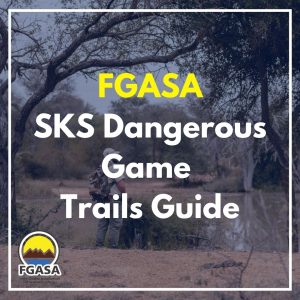
Follow the steps below to progress to your SKS (Special Knowledge and Skills) DG (Dangerous Game) Trails Guide Qualification:
- You need to already be a FGASA member, your membership needs to be up-to-date
- Need to have the full FGASA Professional Field Guide and full FGASA Professional Trails Guide Qualifications
- Enroll for the FGASA SKS DG qualification and purchase the FGASA SKS DG Workbook
- Complete the workbook prior to your assessment (compulsory)
- Your ARH must be valid (ARH expires every three years, to renew your Trails Guide certificate an ARH assessment must be conducted and passed every three years).
- You need to log a MINIMUM of 1200 hours as either 1st or 2nd rifle. This needs to be recorded in your Dangerous Game Logbook. (Please see detailed requirements in the PDF linked below)
- Log a minimum of 600 encounters. This needs to be recorded in your Dangerous Game Logbook. (Please see detailed requirements in the PDF linked below)
- Your Dangerous Game Logbook needs to be submitted to and signed off by the FGASA Head Office
- You need to complete the SKS (DG) practical assessment: This is a multi–day backpacking/primitive trail in a dangerous game area where all the different dangerous game categories occur. (Please see detailed requirements in the PDF linked below)
- Need to complete and pass the FGASA SKS Dangerous Game shooting assessment.
- You need to have the Tracker III certificate or higher (Tracker certificates are a combination of animal Track & Sign and animal Trailing)
- You need to have the Wilderness First Aid Level 2 Certificate
- You will be awarded with your FGASA SKS Dangerous Game Trails Guide Qualification
- No additional steps are required as the FGASA SKS Dangerous Game Trails Guide qualification rests solely with FGASA
**Full qualification requirements are detailed in the PDF below. Please be sure to read this carefully.
Marine Guide®

Follow the steps below to get your Marine Nature Site Guide Qualification:
- Visit www.fgasa.co.za and register to become a member
- Enroll for the Marine Nature Site Guide NQF2 Qualification and pay the relevant fee
- Enrollment fee includes: registration with FGASA, membership subscription for one year, all required learning materials
- Study the learner manual and complete the workbook to help you prepare for the theory exam
- Book and pay for your theory exam when you are ready to write it
- Pass the exam with a minimum of 75%, this will declare you theoretically competent
- Book your practical assessment with a CATHSSETA Accredited FGASA Assessor
- Pass the practical assessment
- You will be awarded with your Marine Nature Site Guide NQF2 qualification
- Additional steps are required to guide legally in South Africa
- Register with CATHSSETA (FGASA will do this on your behalf – additional documentation required)
- Once you have your CATHSSETA number you must register with the National Department of Tourism (NDT)
- Find the NDT’s Registrar for your province here
- Must have a valid First Aid certificate recognised by the Department of Labour South Africa
- Must have a Professional Driver’s Permit (PrDP) from the Licensing Department if you intend to drive guests in a vehicle
**Full qualification requirements are detailed in the PDF below. Please be sure to read this carefully.
Your deep dive into Marine Guiding starts here! Our Marine Guide NQF2 skills programme will give you the needed knowledge and skills, built from a solid foundation to excel as a Marine Guide and deliver informative, fun, safe and ethical guided experiences on Southern Africa’s incredible coastlines!
Our Marine Guide (NQF2) skills programme establishes a solid foundation of necessary knowledge, hard-skills and soft-skills needed to excel as a Marine Nature Site Guide. The Marine Guide NQF2 course contains two volumes of the learner manual and one workbook covering the following learning modules and outcomes:
Marine Guide Learner Manual: Volume 1
Module 1: Introduction to Maring Guiding
This learning module contains five units that will equip you with necessary knowledge on what marine guiding is, the coastal marine guiding experience, the ethics of being a professional marine guide, guiding principles and code of conduct expected of FGASA qualified marine guides, as well as an overview of how to qualify and register yourself.
Module 2: Creating a Guided Marine Experience
In this module you will cover ten learning units that will equip you with the ability to effectively communicate with your guests, to be mindful of cultural difference between guests, how to communicate effectively and other important considerations of being a Marine Guide.
Module 3: The Coastal Marine Environment and the Two Oceans
This module contains three units that will enable you to understand coastal and marine environments, the two oceans in southern Africa as well as their biodiversity, the three coastal regions of South Africa and their differences, and the coastal habitats of South Africa as well as some of the wildlife and plants you may encounter within them.
Module 4: Geology and the Coastal Environment
This module covers 12 learning units, at the end of this module you will be able to explain geology, topography and the basic composition of the earth. You will also be able to discuss plate tectonics, the rock cycle rock formation, weathering, and erosion, soil ecosystems and profile as well as geographical relationships.
Module 5: Astronomy
In this module you will cover nine learning units to will enable you to explain and interpret the southern night skies, astronomical phenomena, the planets and their positions in our solar system, common constellations and their prominent stars, the phases of the moon, eclipses, the effects of celestial bodies on oceanic tides, intertidal ranges and the tools of the trade for astronomers.
Module 6: Weather and Climate
This module contains 12 learning units, by the end of this module you will be able to understand and explain the differences between weather and climate, the influences on South Africa’s climate, pressure cells and associated weather, cloud types and what they mean, and the general climate of Southern Africa.
Module 7: Basic Marine Ecology
By the end of the seven units contained in this module you will be able to talk about ecology and ecosystems, marine ecosystems, the nutrient cycle and the trophic pyramid, and relationships between living things.
Module 8: Basic Taxonomy
This module will teach you the basics of the taxonomical hierarchal order and how living organisms are named. By the end of this module, you will be able to discuss and teach this to your guests.
Marine Guide Learner Manual: Volume 2
Module 9: Sea Plants (algae) including Dunes, Mangrove, and Saltmarsh Plants
At the end of the ten learning units contained within this module you will have the knowledge needed to identify marine plants and speak about their classifications, varying types of algae, seaweeds and their uses as well as mangrove, saltmarsh and coastal dune botany.
Module 10: Marine Invertebrates
This module contains nine learning units, by the end of the module you will be able to identify and discuss what invertebrates are and how to classify them, and you will have a comprehensive understanding of various categories of different marine invertebrates.
Module 11: Amphibians
After completing the seven learning units in this module you will be able to identify and talk about the classification of amphibians, understand, and discuss frog calls and their functions, and various aspects of their behaviour, and amphibian metamorphosis.
Module 12: Marine Reptiles
In this module you will cover five learning units that will equip you with the knowledge to discuss marine reptiles, differentiate between three main orders of reptiles and their defining characteristics and behaviours.
Module 13: Marine Fish
In this module you will cover 11 learning units, giving you the skills and information needed to talk about what a fish is and how to define them, diverse types of different fish and the physiology, the sense organs fish use to survive, natural buoyancy and swim bladders and breathing.
Module 14: Coastal Marine Birds
This module contains 10 learning units that will enable you to discuss and describe birds with a particular emphasis on coastal marine birds. By the end of this module, you will understand the characteristics of birds as well as being able to talk about various species of coastal marine birds, where they are found, their adaptations and their behaviours.
Module 15: Coastal Marine Mammals
By the end of this learning module, you will have a clear grasp of various marine mammals you are likely to find in the oceans surrounding Southern Africa. You will understand how marine mammals are classified and what separates them from their terrestrial counterparts. You will learn about whales, dolphins, and Baleen whales as well as fur-seals and sea otters.
Module 16: Animal Behaviour (Ethology)
By the end of this module, you will be able to discuss the behaviour of various marine animals, hoe the communicates, the difference between territories and home ranges, group social structures and hierarchies, and the sex change behaviour of fish.
Module 17: Historical Human Habitation
In this final module you will cover 13 learning units all describing the importance and impacts of human habitation. You will be able to talk about early human habitation covering historical epochs from the early stone age to the late iron age, discuss coastal human habitation, human impacts on the coast, the cultures of Southern Africa, modern sustainable fishing, and marine harvesting, South African aquariums, and their purpose, and transfrontier parks and biosphere reserves.
FGASA Exclusive Certificates

Follow the steps below to get your first FGASA Birding Certificate
- You need to be a FGASA member, your membership needs to be up-to-date
- Need to have Nature Site Guide NQF2/NQF4 or Professional Field Guide qualification
- Enroll for the FGASA Bird Guide certificate
- Enrollment fee includes: all required learning materials
- Book for the FGASA Bird Guide slide & sound exam (this includes one biome of your choice as well as the core bird list)
- You need to pass the bird Slide & Sound exam (75% for the slides section and 75% for the sound section)
- You need to complete the FGASA Bird Guide workbook, this is compulsory
- You may now book your Bird Guide practical assessment directly with a FGASA Assessor
- You need to pass the practical assessment and be declared competent
- You will be awarded your regional Bird Guide certificate
**Full qualification requirements are detailed in the PDF below. Please be sure to read this carefully.

Follow the steps below to get your FGASA Special Knowledge and Skills (SKS) Birding Certificate
- You need to be a FGASA member, your membership needs to be up-to-date
- Need to have the FGASA Professional Field Guide qualification
- Need to have the FGASA Bird Guide certificate
- Book for the FGASA SKS Bird Guide slide & sound exam
- You need to pass the bird Slide & Sound exam (75% for the slides section and 75% for the sound section) as well as the open book bird slide assessment
- You will be awarded your FGASA SKS Bird Guide certificate
**Full qualification requirements are detailed in the PDF below. Please be sure to read this carefully.
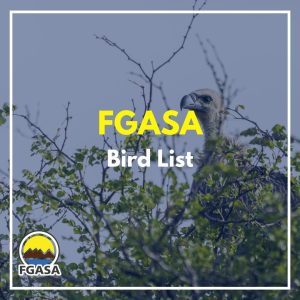
Please see the PDF linked below this section for the most recent FGASA Bird List for each of South Africa’s nine biomes as well as bird lists for neighboring countries.
You will only be tested on birds that appear on this list.
Please make sure to read the list carefully to see what birds you need to know by sight only, and what birds you will need to know by sight and sound.
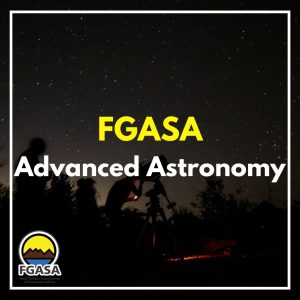
Follow the stapes below to get your FGASA Advanced Astronomy Certificate
- You need to be a FGASA member, your membership needs to be up-to-date
- Need to have Nature Site Guide NQF2/NQF4 or Professional Field Guide qualification
- Enroll for the FGASA Advanced Astronomy certificate
- Enrollment fee includes: all required learning materials
- You need to complete the FGASA Advanced Astronomy workbook to help you prepare for the exam, this is compulsory
- You need to pass the Advanced Astronomy theory exam (75%) and be declared competent
- You may now book your Advanced Astronomy practical assessment directly with a FGASA Assessor qualified to assess astronomy
- You must pass the practical assessment and be declared competent
- You will be awarded your FGASA Advanced Astronomy certificate
**Full qualification requirements are detailed in the PDF below. Please be sure to read this carefully.
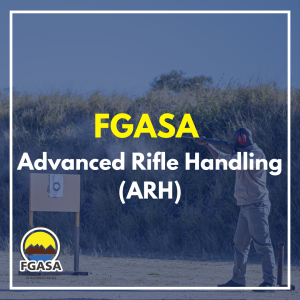
Follow the steps below to get your FGASA Advanced Rifle Handling Certificate (ARH)
- You need to be a FGASA member, your membership needs to be up to date
- The FGASA ARH is a requirement for the Trails Guide Qualification. You need to have already completed the Nature Site Guide NQF2 or NQF4 Qualification. You will not be permitted to complete the ARH shooting assessment without first obtaining one of these qualifications.
- You need to have been declared competent against the relevant PFTC firearms proficiency unit standards (compulsory)
These are as follows:
• 117705 – Demonstrate knowledge of the Firearms Control Act 2000 (Act No 60 of 2000)
• 119651 – Handle and Use a Manually operated Rifle
• 123519 – Handle and Use a Manually operated Rifle for Business Purposes - You may now be practically assessed by a FGASA ARH assessor on a shooting range. Once you have passed the ARH (been declared competent) you will have a valid ARH and may operate a rifle for guiding purposes.
Note: The Advanced Rifle Handling (ARH) shooting competency is only valid for a period of 3 years, after 3 years you will need to book for an ARH renewal and complete another shooting assessment.
*Important: The ARH competency is not a standalone certificate, it may only be awarded in conjunction with a Trails Guide certification. If you complete an ARH shooting assessment and you do not have the Trails Guide NQF2 or NQF4 you will not be awarded an ARH certificate. If your ARH competency expires, your Trails Guide certification will also expire. As soon as you renew your ARH by completing another assessment, your Trails Guide certification will automatically be reinstated (you will not be required to redo Trails Guide, you only need to complete the ARH shooting assessment).
**Full qualification requirements are detailed in the PDF below. Please be sure to read this carefully.
The South African Government’s stance on weapons and especially firearms has always been incredibly strict. This is to ensure that anyone who owns and/or operates a firearm has all of the correct proficiencies, has the correct experience and knowledge, and most importantly, understands the law regarding firearms completely. FGASA has been working with our Executive Committee and our SKS DG Committee to ensure that all our members who operate rifles as Trails Guides are aware of the law of South Africa, and know exactly what is legally required.
Please see the FGASA ARH guidelines below:
1. South Africa has one of the most detailed and outlined firearm policies in the world regarding gun ownership and the use of firearms. This is good because it means the law is written and cannot be altered or superseded by anyone.
2. FGASA does not have any rule or suggestion in place that overrides the Firearms Control Act (FCA) 60 of 2000.
3. FGASA strongly recommends that all members who own or make use of a rifle should read, become familiar with, and follow the Firearms Control Act in accordance with the law. Members my visit the South African Government website here to read and download the full Firearms Control Act of South Africa PDF here.
4. It is recommended that all FGASA members, who wish to obtain the FGASA ARH, apply for and get a firearms competency which expires and is renewed every 5 years, regardless of whether they own a firearm or not. (FCA chapter 5)
5. It is required that for guides to travel the entire distance of the trails guide journey (including ARH), that the guide has in place the following 3x Unit Standards in order to follow the Law of the Republic of South Africa:
• 123519 (FCA Chapter 5 paragraph 9 sub s),
• 117705 (FCA Chapter 5 paragraph 9 sub q) and
• 119651 (FCA chapter 5 paragraph 9 sub r)
For more information on how and where to obtain these proficiencies please visit the Professional Firearm Trainers Council (PFTC) website here.
6. Private firearms used by guides should be licensed according to the use for which they are intended for and under the correct section of the Firearms Control Act. If any business is conducted with a privately owned firearm then in accordance with the FCA it should be registered as such. In other words, if the guide is using their privately owned firearm to conduct walks or trails with paying guests or clients, then the firearm must be registered for business use. This may be found in FCA section 20.
7. Take note that there are many firearm expert lawyers in South Africa. Here are the contact details of 3 different firms should you have any queries, or need assistance. Alternately please contact your own choice of firearms specialist lawyer for assistance:
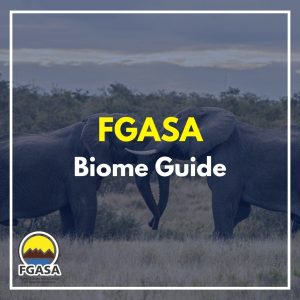
Follow the stapes below to get your FGASA Biome Guide Certificate (Biome Specific)
- You need to be a FGASA member, your membership needs to be up-to-date
- You need to have already completed the Nature Site Guide NQF2 or NQF4 or Marine Nature Site Guide NQF2 Qualification.
- Select which biomes you want to be assessed for, purchase and complete the biome workbooks. This is compulsory.
- There is no practical assessment for the Biome Guide certificate, your completed workbook functions as a portfolio of evidence of your learning.
- Once your workbook has been marked and you have been found competent you will receive your FGASA Biome Guide certificate (biome specific).
- In order to obtain your FGASA National Biome Guide Certificate you will need to complete the workbooks for each of South Africa’s 9 biomes.
**Full qualification requirements are detailed in the PDF below. Please be sure to read this carefully.
FGASA Non-Guiding Certificates

Follow the steps below to get your FGASA Nature Enthusiast (Non-Guiding) Certificate:
- Visit www.fgasa.co.za and register to become a member
- Enroll for the FGASA Nature Enthusiast Certificate and pay the relevant fee
- Enrollment fee includes: registration with FGASA, membership subscription for one year, all required learning materials
- Study the learner manual and complete the workbook to help you prepare for the theory exam
- Book and pay for your theory exam when you are ready to write it
- Pass the exam with a minimum of 75%, this will declare you competent
- You will be awarded with your FGASA Nature Enthusiast (Non-Guiding) Certificate
PLEASE NOTE: This is a NON-GUIDING certificate and is meant for interest purposes only. This certificate cannot be converted into the Nature Site Guide NQF2 qualification at a later stage. If you want to work as a field guide or pursue a career in safari tourism please enroll for the Nature Site Guide NQF2 qualification.
**Full qualification requirements are detailed in the PDF below. Please be sure to read this carefully.
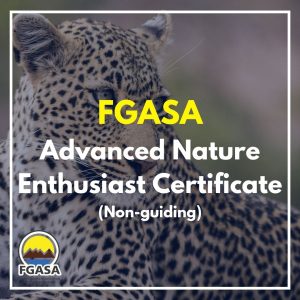
Follow the steps below to get your FGASA Advanced Nature Enthusiast (Non-Guiding) Certificate:
- You need to already be a FGASA member, your membership needs to be up-to-date
- You need to have already completed the FGASA Nature Enthusiast Certificate. You will not be permitted to register for the FGASA Advanced Nature Enthusiast unless you have already completed the FGASA Nature Enthusiast Certificate.
- Enrollment for the certificate and pay the relevant fee to receive your learning materials
- Study the learner manual and complete the workbook to help you prepare for the theory exam
- Book and pay for your theory exam when you are ready to write it
- Pass the exam with a minimum of 75%, this will declare you competent
- You will be awarded with your FGASA Advanced Nature Enthusiast (Non-Guiding) Certificate
PLEASE NOTE: This is a NON-GUIDING certificate and is meant for interest purposes only. This certificate cannot be converted into the Nature Site Guide NQF4 qualification at a later stage. If you want to work as a field guide or pursue a career in safari tourism please enroll for the Nature Site Guide NQF2 qualification.
**Full qualification requirements are detailed in the PDF below. Please be sure to read this carefully.
Becoming a FGASA Mentor and/or Assesor
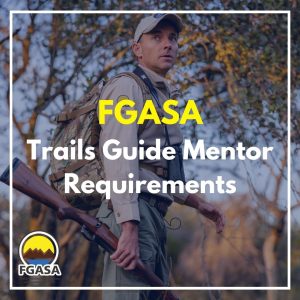
Follow the steps below to become a FGASA Trails Guide Mentor:
- You need to be a FGASA Professional Field Guide with a minimum of three years experience, your membership needs to be up-to-date
- You need to be nominated in writing to FGASA management. The nomination needs to come from three current mentors
- The potential new Mentor needs to provide FGASA Management and the SKS Dangerous Game (DG) Standards Committee with a comprehensive CV
- You need to attend an interview with the FGASA Management and the SKS (DG) Standards Committee.
- FGASA Management and the SKS (DG) Standards Committee need to agree that the individual is suitable to be a mentor before they can be appointed.
- The potential new Mentor needs to attend a training session
- You need to support FGASA and believe in what the Association is striving towards.
- You will be awarded and recognised as a FGASA Trails Guide Mentor
IMPORTANT NOTE: Becoming a Trails Guide Mentor follows the process of being appointed to the position. It is not guaranteed that you will automatically qualify to become a mentor.
*Professional Trails Guide Requirements – see separate flow chart under the Qualifications Page on the FGASA Website
**Full qualification requirements are detailed in the PDF below. Please be sure to read this carefully.

Follow the steps below to become a CATHSSETA Accredited FGASA Assessor:
- You need to be at least 25 years of age or older, your membership needs to be up to date
- Need to be a FGASA Professional Field Guide with a minimum of three years experience
- Need to have the Track & Sign III Certificate
- Contact FGASA to request and receive the FGASA Assessor’s application form. Complete the form and submit back to FGASA with additional documentation. (Please see PDF below with full details).
- If you meet the necessary criteria FGASA will invite you to attend an interview.
- If you are successful in your application and interview you will need to attain the relevant Assessor’s Qualification from the ETDP SETA (Education, Training, and Development Practices Sector Education and Training Authority).
- You will need to write the FGASA Assessor’s Theory exam.
- You will need to attend a minimum of 5 different FGASA assessments, as a mentee, with different current FGASA assessors.
- You will need to undergo the FGASA Assessors assessment and pass (be declared competent).
- Once you have been declared competent your first THREE assessments need to be done with a current FGASA Assessor.
- You may only assess the Nature Site Guide NQF2 level until you have met the requirements to assess at the next level.
- You will need to attend the FGASA Assessor Workshops.
- You need to be currently registered with the National Department of Tourism (NDT).
- You need to have a valid First Aid Certificate
IMPORTANT NOTE: Becoming a FGASA assessor follows a process of being appointed to the position. It is not guaranteed that you will automatically qualify to become a FGASA assessor.
If you wish to assess a specialist qualification, you need to be qualified in the relevant specialist qualification or SKS qualification.
*Professional Trails Guide Requirements – see separate flow chart under the Qualifications Page on the FGASA Website.
**Full qualification requirements are detailed in the PDF below. Please be sure to read this carefully.
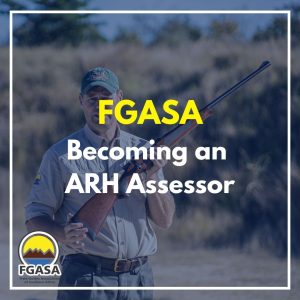
Follow the steps below to become a CATHSSETA Accredited FGASA Advanced Rifle Handling (ARH) Assessor
- You need to already be a FGASA Assessor, your membership needs to be up-to-date
- Need to have the FGASSA Professional Trails Guide Qualification
- You need to obtain the Range Officer Course Certificate (US123516)
- Contact FGASA to request and receive the FGASA ARH Assessor’s application form. Complete the form and submit back to FGASA with your valid Range Officer Course Certificate.
- You need to complete the FGASA ARH Assessor Workbook. This is available from FGASA.
- You need to attend the FGASA ARH Assessor’s Workshop
- You will need to complete an assessed ARH shoot and be declared competent, meeting the ARH protocols [V2019]. This must be conducted by a FGASA SKS(DG) Assessor.
- You will need to undergo the mentored Assessors assessment and be declared competent. You will then be allowed to assess the ARH shoots.
IMPORTANT NOTE:
All ARH Assessors need to shoot their ARH renewal every 3 years with a FGASA SKS (DG) Assessor.
A logged peer-review shoot needs to be completed once every 3 years. This may be conducted during the ARH renewal shoot.
Becoming a FGASA ARH Assessor follows a process of being appointed to the position. It is not guaranteed that you will automatically qualify to become a FGASA ARH assessor.
**Full qualification requirements are detailed in the PDF below. Please be sure to read this carefully.

FGASA is allowing NQF4 Trails Guides and those with a Tracker III qualification to apply to become “Resident Assistant Mentors.” The Resident Assistant Mentors (RAM) will be site specific and may not “roam” to provide mentorship outside of their designated area of operation. The RAM, an individual that meets the criteria, must be nominated and recommended by the specific employer site/reserve/head guide. The form can be found here (RAM Application Form) and should be completed, signed and returned to qualifications@fgasa.org.za.
RAM Requirements for Trails Guides:
• Minimum of 400 walking hours and 200 DG encounters
• Must be a paid-up member of FGASA
• Must have valid ARH and PFTCs
RAM Requirements for Trackers:
• Employed Tracker with minimum ‘Tracker III’ level
• Minimum of 10 years experience working as a Tracker
• Must be a paid-up member of FGASA
The successful appointed Resident Assistant Mentor will then be empowered to sign-off on Apprentice Trails Guide logbooks for the following:
• The Apprentice Trails Guide may accumulate 50 hours on-foot as 2nd rifle with a FGASA approved Trails Guide NQF4 Resident Assistant Mentor walking as 1st Rifle.
• The Apprentice Trails Guide may accumulate an additional 20 hours on-foot as single rifle with a FGASA approved Tracker III Resident Assistant Mentor tracking dangerous game, without guests.
• The Apprentice Trails Guide must complete a minimum of 30 hours on-foot as 1st Rifle with a FGASA approved Professional Trails Guide/SKS (DG) Trails Guide Mentor as 2nd Rifle. During this the Apprentice Trails Guide must complete at least 10 dangerous game encounters of the required 40 encounters.
• During the Apprentice Trails Guide programme the Apprentice Trails Guide must successfully complete a minimum of 100 hours walking and 40 dangerous game encounters from 6 out of 7 of the dangerous game category animals.
*Important Note: The 100 walking hours and 40 encounters needed within the Apprentice Trails Guide programme are the minimum required to be assessed for Trails Guide. The candidate may require further hours or encounters or both in order to effectively prepare the candidate for assessment. The Professional Trails Guide or SKS (DG) Trails Guide will provide the Apprentice Trails Guide with sign-off and a recommendation that they are prepared to assess for Trails Guide.
Additional Information
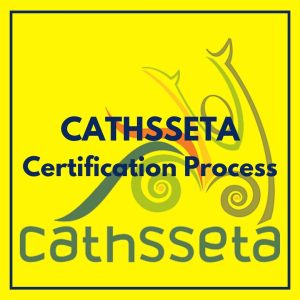
CATHSSETA is the Culture, Art, Tourism, Hospitality, and Sport Sector Education and Training Authority
We, as FGASA, are accredited through CATHSSETA, to provide Nature Guide training.
- Once you have completed your qualification, if you are planning on becoming a Nature Site Guide in South Africa, we upload your qualification and achievements, onto the CATHSSETA database.
- If the member has submitted all the correct documentation (CATHSSETA/FGASA application form and certified ID) it will be sent to CATHSSETA so that they may issue a certificate. IF CATHSSETA do not receive these documents the member will not receive a CATHSSETA certificate.
- They then issue you with a CATHSSETA certificate (separate to the FGASA certificate) which allows you to register as a legal nature site guide with the National Department of Tourism (NDT). (It takes a long time for this certificate to be issued and it is reliant on all documentation submitted being valid and in order)
- Find the NDT’s Registrar for your province here
- For each accredited qualification (NQF2, NQF4, VPDA) you will need to complete a new form to be sent in to CATHSSETA. Your qualification will not be loaded with CATHSSETA if you do not complete the form.
- FGASA DOES NOT issue CATHSSETA certificates.
- CATHSSETA only print certificates 4 times a year – If achievements are loaded after a particular quarterly cut off date it can take another 4 months for CATHSSETA to issue a certificate number.
- For any further qualifications accredited with CATHSSETA, for example qualifying as Nature Site Guide (NQF4) or Trails Guide (NQF4), CATHSSETA now requires that you complete a whole new learner agreement, and resubmission of all above documentation.
- FGASA, CATHSSETA and the National Dept of Tourism are three totally separate organisations. Whatever CATHSSETA requests of FGASA and its learners, it totally outside of the control of FGASA.
- FGASA would recommend that if you are NOT planning on becoming a Nature Site Guide, and actually working in South Africa, that you do NOT request registration with CATHSSETA.
- If you are going to be qualifying for Nature Site Guide (NQF4) or your Trails Guide (NQF4) you will need to complete a new CATHSSETA registration form. This is the membership form available on our website or from the membership department.
- When completing the form for these qualifications, you need only complete Section 6 & 7. You will need to initial ALL 14 pages, and then send through the WHOLE application form including a certified copy of your ID. The second last page (learner signature) also needs to be signed.
The CATHSSETA registration process requires the following from each learner:
- A Signed Learner Agreement. ALL fields on the learner agreement form need to be completed.
- A certified copy of ID/passport within a three month period
- Please contact Hermia on cathsseta@fgasa.org.za in order for us to make arrangements with you to send you your certificate.
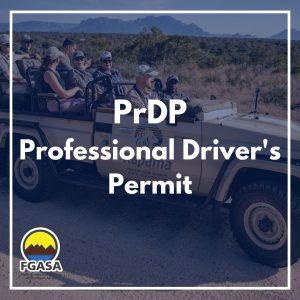
Why do I need a PrDP and how should I get it?
- If a tourist guide is going to be transporting passengers (guests/visitors) in motor-vehicle s/he must be in possession of a valid PrDp.
- The PrDp is valid for two years and thus needs to be renewed before expiry.
- In order to attain a PrDp a guide has to be 21 years of age, thus if a learner qualifies and registers with National Department of Tourism and s/he is under the age of 21, the guided experiences conducted by such a guide can only be by means of walking, bicycle, canoe, horse, and any other means other than driving a motor-vehicle of any kind with people.
- It is important that learners who are striving to be guides are aware that they cannot conduct guided experiences while driving a motor-vehicle until they have turned 21 years of age and then attain a PrDp licence.
- It is important that all Delivery Partners make sure that any prospective learner (potential course attendee) is fully aware of the legal requirements pertaining to transporting people in a motor-vehicle for guiding purposes and that their age (if under 21) could prohibit them from employment if the job requirements include conducting guided experiences that involve driving a motor-vehicle
- You can get your PrDP from any licensing department in South Africa if you meet the needed criteria
- For more information on the exact steps you need to take please look at the official process as laid out by the South African Government here
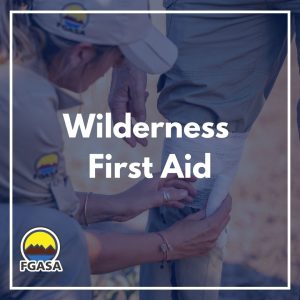
Having a first aid certificate is a requirement for all FGASA Guiding Skills Programmes. The First Aid certificate must be valid and recognised by South Africa’s Department of Labour. The reasons for needing a first aid certificate are listed below:
- Safety of Guests: As a guide, you are responsible for the well-being and safety of the guests under your care. While guiding, unforeseen accidents or medical emergencies can occur, such as wildlife encounters, injuries, accidents, or illnesses. Possessing first aid skills allows you to provide immediate assistance, stabilise the situation, and potentially save lives until professional medical help can be obtained.
- Remote Locations: Guided tours, especially safaris, often take place in remote and wild environments, where medical facilities may be far away or limited. In such cases, being equipped with first aid knowledge and skills is crucial, as it enables you to provide initial medical assistance while awaiting further medical attention or evacuation.
- Wildlife Interactions: Field guides frequently encounter wildlife in their natural landscapes. Knowledge of first aid helps guides handle situations involving potential injuries from animal encounters, such as snake bites, insect stings, or other wildlife-related incidents.
- Professionalism and Trust: Obtaining a first aid certificate demonstrates your commitment to professionalism, preparedness, and the safety of your guests. It enhances your credibility as a guide and assures guests that you possess the necessary skills to handle emergencies competently.
- Regulatory Requirements: In South Africa, having a valid first aid certificate is a legal requirement to work as a guide. It ensures that guides meet certain standards of safety and preparedness set by the relevant authorities. This is a legal requirement to register as a guide with the National Department of Tourism (NDT) and to guide legally in South Africa. Your registration takes place at the provincial level.
By acquiring a first aid certificate, you demonstrate your readiness to handle medical emergencies, prioritize guest safety, and fulfill the requirements expected of a responsible safari guide.
Although FGASA does not facilitate First Aid Training we do work with Specialist Training Delivery Partners who are endorsed by the Department of Labour and can assist with your First Aid training, exam and practical. Please see detailed list here.

